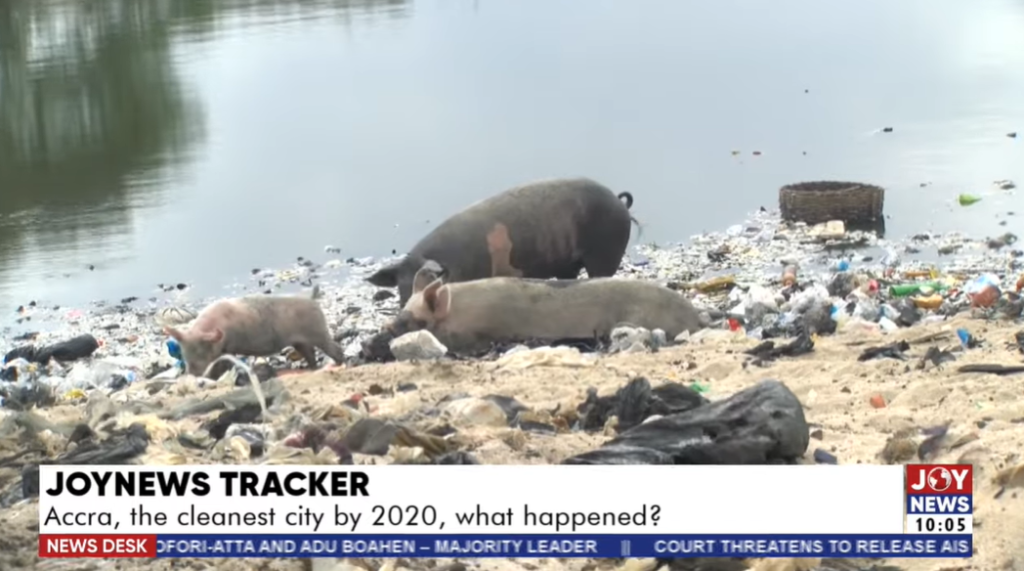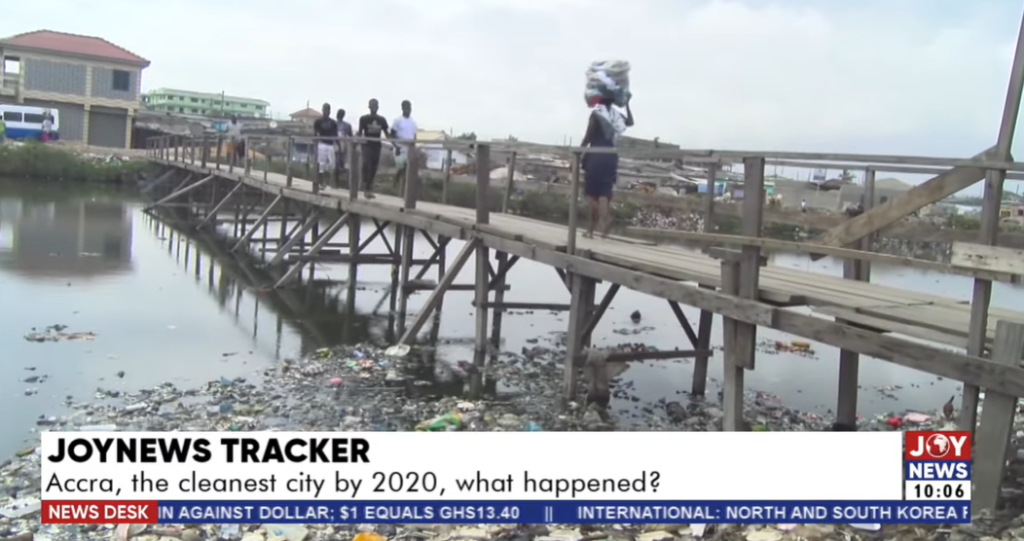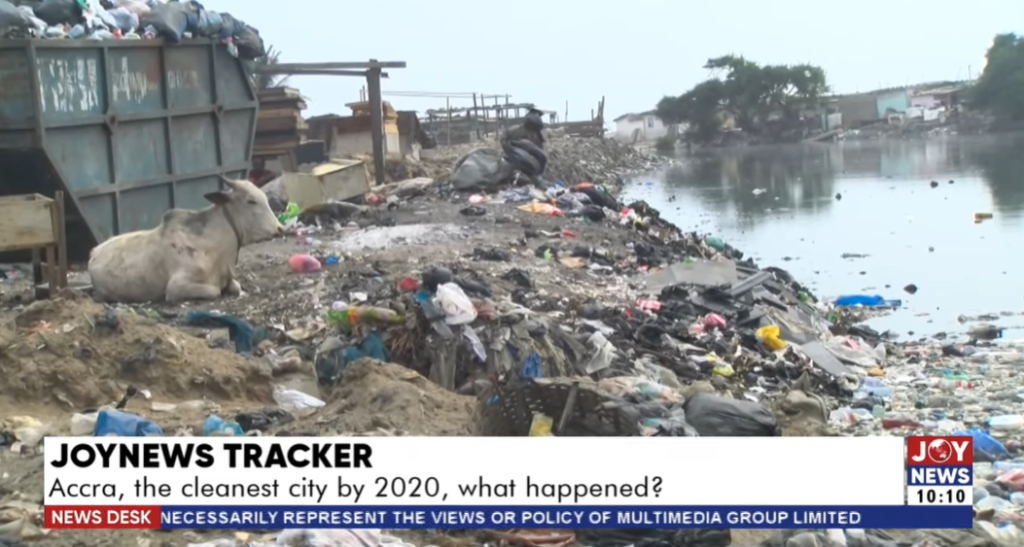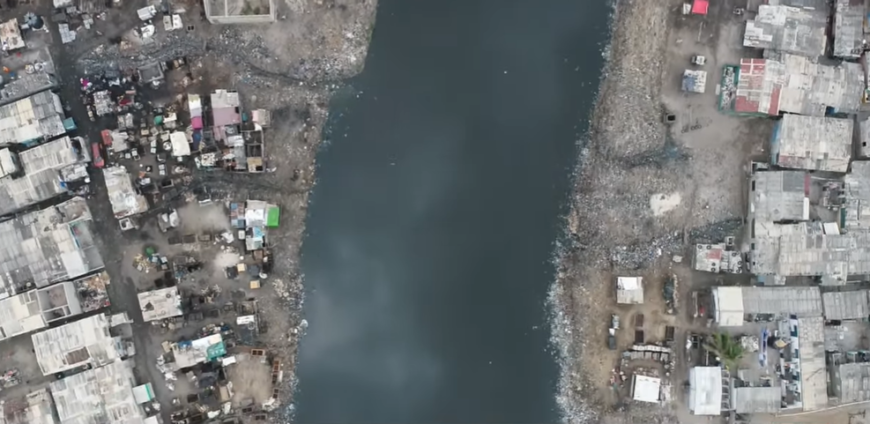“By the end of the four years of my term in office as president, Accra will be the cleanest city in Africa.” President Akufo Addo delivered this speech with a burning zeal in 2017.
This promise resonated with the public and gave many people hope that at least the new NPP government was poised to set everything right in the country. To sanitation watchers, it was a right signal to citizens to keep their environment clean.
For many years the city of Accra has been infamous for its filth. Streets, markets and drains are adorned with filth. The bad sanitation in the city is a major contributor to perennial flooding that costs many their lives.
To further show greater commitment and reverse this worrying trend, President Akufo Addo launched a National Sanitation campaign and laid out a plan to attain the promise to make Accra the cleanest city.
The comprehensive program included the establishment of the National Sanitation Authority, and the establishment of the Dedicated Sanitation Fund to help make the country clean.
“Successive Ghanaian governments have tried to reverse this trend and inculcate a habit of greater discipline in the care of our surroundings. It has not succeeded. My government intends to make a fresh start.” President Akufo-Addo pledged.
In 2019, Sanitation Minister Cecelia Dapaah realizing that the promise could not be achieved extended the deadline to 2024.
At a press conference, she said “Insha Allah, the President will go for two terms, and at the end, Accra would have been, and we are on course, God is in control, and the battle is still the Lord’s. And to tell you that His Excellency the President is so serious with this call to all of us to make Accra the cleanest city…”
This change of timelines to make Accra the cleanest city shocked many including the Coalition of Non-Governmental Organisation in Water and Sanitation (CONIWAS). A member of the Coalition and WASH Consultant, Ibrahim Musah, said Cecilia Abena Dapaah was “playing smart with Ghanaians” when she moved the President’s date four years ahead.
A council member of CONIWAS, Patrick Apoya is disappointed. Speaking with so much verve he said, “The President actually meant it when he made the promise, and you could see the genuineness of it. But he lacked the backing of his ministers, who were speaking one thing when the President was speaking another thing.”

When the minister shifted the deadline, the eagerness to clean Accra waned. Mr. Apoya says, “The Ministry officially started shifting their statement, [saying] that, ‘The President didn’t mean the first term, the President actually meant his tenure in office.’ He also lacked the cooperation of his Minister of Finance, to actually put in the budget to go with the promise”.
Six years down the line, the plan to clean up Accra has receded. “It was almost as if the launching of the National Sanitation campaign was to announce the end of the desire or the willingness of the government to pursue the Clean City Agenda.” Mr. Apoya cried out.
When JoyNews asked him to rate the government’s performance on making Accra the cleanest city in Africa, on a scale of 1 to 10,
Mr. Apoya said he would rate the government 1 out of 10.
“I’ll give them 1. First and foremost, the preparatory agenda that should have put us on track to pursue it was never put in place. That’s number one. The government will tell you they’ve established marshalls and so on but it’s all talk,” he asserted.
Filth is still threatening to swallow residents of Accra, especially Chorkor located in the South Western part of Accra.
The community is infamous for its muck-covered coast.
Heaps of refuse border the coastline, completely fused with the sands, spilling over onto the surface of murky water that abuses the sight and smell of the bypasser.
Pigs, cats and dogs snuggle in the filth while people go about their daily business in the presence of this growing menace, completely accustomed to its sight and stench.

Residents agree that they cannot continue to live in filth but do not know how to bring every resident on board the vision to make Accra the cleanest city in Africa.
“When the rubbish container becomes full, the garbage trucks fail to empty the containers. Rubbish overflows and spills over into the lagoon so our mothers also dump rubbish at the edge of the lagoon. We need more rubbish containers here, and dumping of rubbish should be free,” said James Mensah a resident of Chorkor.
Mrs. Anita Bill, a fishmonger in Chorkor, explains that although some residents do their best to clean their environment and avoid indiscriminate pollution of the environment, many more residents litter with impunity because there is no consequence to littering. “The police should arrest people for littering. It will deter others from doing so. If the people who pollute are fined heavily, others will change.”
Sharing ideas on how to make Chorkor clean, James Mensah agreed with Mrs. Bill. He said, “There is ‘freedom of everything’. People litter as they wish. When they are arrested, they will put a stop to it.
Oko Bannerman, also a resident of Chorkor, is overwhelmed by the growing filth in the community. He is eager to see the President achieve the agenda of making Accra the cleanest city. He shares some ideas of what he will do if he had the power. “I’m a serious NPP member, but President Akufo Addo is too laid back. People have too much freedom and so they litter freely. The President should be like former President Rawlings.”
Some residents also have a solution. They want the government to arrest polluters to serve as a deterrent to the larger population.
But there is another problem here. Waste containers are not emptied as often as they should, so filth always overflows.

Just along the Chemu lagoon are waste containers but residents say they are not permitted to dump rubbish into them. Residents have consciously dumped rubbish at the edge of the lagoon. “The green containers you see are owned by the government, but we are not allowed to use them. Vehicles come and carry them to other locations. If we are allowed to use these containers, and even told to pay 50 pesewas for dumping rubbish, we will pay.” James said.
The absence of waste containers spells out liberty to residents, who dump refuse wherever they please. The resulting filth has become characteristic of their home, and so they go about their duties in total oblivion of the ticking time bomb they are sitting on.
So, can government lead and ensure Accra becomes the cleanest city in Africa by at least 2024, or will some stubborn citizens be left to pollute without any repercussions?
Will Accra ever be free of the suffocating grasp of filth?
Latest Stories
-
From Mortuary to Matrimony: Feature on how couple’s love journey brewed at the morgue airs on Joy Prime
6 mins -
Ghana’s LPG prices rank among the highest globally – LPG Marketers Association
13 mins -
Filth Exhibition: Residents near Korle Gonno bear the brunt of nationwide filth
27 mins -
We’ve not selected NPP members as returning officers – EC replies Mahama
44 mins -
We’ll not honour any invitation – ECG tells Ashanti Regional Minister
1 hour -
Dumsor vigil to hit Accra
1 hour -
Supreme Court rule for dual citizens to hold other key positions laudable – Kwaku Asare
1 hour -
‘No one is above the law’ – CAF president on match-fixing allegations against Samuel Eto’o
2 hours -
Manchester City thrash Brighton to go second in table
2 hours -
NDC’s running-mate speech proves readiness to lead – Asah-Asante
2 hours -
Further win for nibima as another KNUST study supports medicinal prowess
2 hours -
World Bank’s food price index eases; maize, wheat prices hit 3-year low
4 hours -
2020 polls all about pulling Ghana back from precipice of destruction, corruption – Naana Jane
4 hours -
Guru expresses interest in contesting SRC election at UG
4 hours -
Oil prices projected to average $84 in 2024 – World Bank
4 hours

